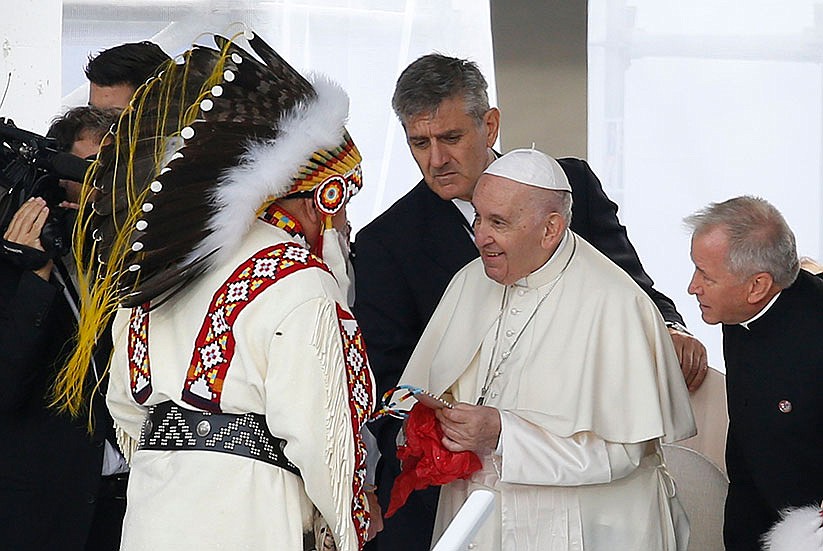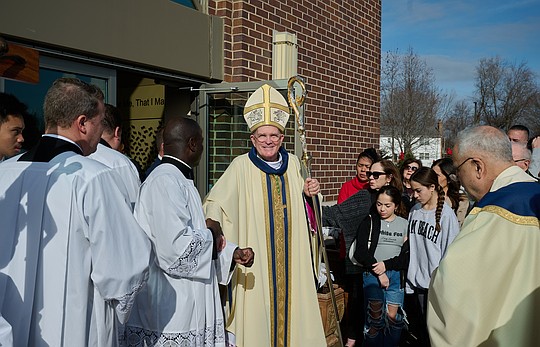Pope Francis 'new approach' leads to 'positive steps forward' in Indigenous-Catholic relations, say experts
March 9, 2023 at 6:18 p.m.

"From our perspective, our history with the Catholic Church is long, complicated and often tragic," said Mitch Case, Regional Councilor for Region 4 of the Provisional Council of the Métis Nation of Ontario. "But with the impact particularly from Pope Francis and his new sort of approach in the last few years, we've seen some positive steps forward."
Case was one of several delegates from Canada's First Nations, Métis and Inuit peoples to meet with the Pope in Rome last year, ahead of Pope Francis' July 2022 pilgrimage to Canada to formally apologize on indigenous land for the Church's role in Canada's residential school system in the 19th and 20th centuries.
The government's residential schools, many of them operated by religious orders, sought to isolate and forcibly strip Indigenous children of their culture and language, while assimilating them to a European way of life, including a European expression of Christianity. Thousands of students were physically, mentally and sexually abused in the process.
The entire residential system upended an original evangelization by the Church in the 17th and 18th centuries that emphasized missionaries living among the people they serve, speaking their language, educating their people on their territory, and cultivating an indigenous expression of Catholicism through their culture.
"We can't talk about our relationship with the Church without speaking about, addressing and understanding that experience, which affected hundreds of thousands of Indigenous children in Canada and the U.S.," said Case. "It's described in our courts as genocide."
At the same time, "Pope Francis has really, strongly understood that our past isn't something we can just (simply) move beyond," said Case. "His leadership has set a path forward in dialogue between us and the Church."
[[In-content Ad]]
Pope Francis' ability to "resonate with Indigenous people in ways other Popes maybe haven't" is due to the fact that "he really does see us as people," Case said.
Specifically, an "emphasis on the poor and helping people" allows Pope Francis to "not just promulgate doctrine, but do what we can do in this world we all share and live in," said Case. "If that's not what we're called to do as human beings, I don't know what is."
That concern for the poor, deeply interwoven with the Pope's advocacy for care of creation, speaks to Indigenous peoples, said Peru-based Maryknoll Sister Patricia Ryan, who has spent close to five decades defending human rights and their relationship to the environment, working for Derechos Humanos y Medio Ambiente (Human Rights and Environment).
While reflecting on the Pope's encyclical "Laudato Si'" with a team comprised of Aymara and Quechua members, "the immediate response was, 'This Pope understands us, he is one with us, he listens to the cry of the earth and the cry of the poor,'" Sister Ryan told OSV News.
In the 2015 encyclical, the Pope highlights the Indigenous' regard for land as "not a commodity but rather a gift from God … a sacred space with which they need to interact if they are to maintain their identity and values."
Two years later, Pope Francis convened the Amazon Synod, which focused on what he called "new ways for the evangelization of that portion of the People of God, especially the Indigenous, often forgotten and without a perspective of a good future, (and) also for the cause of the crisis of the Amazonian forest, (a) lung of fundamental importance for our planet."
The Amazon Synod's final document stated it is "a matter of urgency to give Indigenous pastoral ministry its specific place in the Church," and even proposed the study and discussion of a new Indigenous liturgical rite for the Amazon region's indigenous peoples.
Both Case and Sister Ryan said Pope Francis' willingness to listen to Indigenous peoples has also been essential to progress in healing Indigenous-Catholic relations.
"His emphasis on what the Church can be doing to help those who are less advantaged and need someone to hear them (has) impact," said Case.
"When Pope Francis visited Puerto Maldonado in Peru (in 2018), he came not to give a talk, he came to listen," said Sister Ryan. "And listen he did, to testimonies given by two spokespersons – a woman and a man – of the Indigenous Amazonian population of Peru, who gave witness to the sufferings and indignities, wisdom, commitment and just demands of their peoples and of Mother Earth," she said. "Pope Francis knows the importance of listening."
Gina Christian is a national reporter for OSV News. Follow her on Twitter at @GinaJesseReina.
The commemoration of Pope Francis’ 10th anniversary as pontiff is the joy-filled subject of The Monitor Magazine’s latest COVER and IN FOCUS section. We invite our readers to spend some reflecting on the many ways that the Pope has created a Legacy of Love in his guidance of the Church over this last decade.
Click HERE to view the special section.
Related Stories
Friday, January 02, 2026
E-Editions
Events
"From our perspective, our history with the Catholic Church is long, complicated and often tragic," said Mitch Case, Regional Councilor for Region 4 of the Provisional Council of the Métis Nation of Ontario. "But with the impact particularly from Pope Francis and his new sort of approach in the last few years, we've seen some positive steps forward."
Case was one of several delegates from Canada's First Nations, Métis and Inuit peoples to meet with the Pope in Rome last year, ahead of Pope Francis' July 2022 pilgrimage to Canada to formally apologize on indigenous land for the Church's role in Canada's residential school system in the 19th and 20th centuries.
The government's residential schools, many of them operated by religious orders, sought to isolate and forcibly strip Indigenous children of their culture and language, while assimilating them to a European way of life, including a European expression of Christianity. Thousands of students were physically, mentally and sexually abused in the process.
The entire residential system upended an original evangelization by the Church in the 17th and 18th centuries that emphasized missionaries living among the people they serve, speaking their language, educating their people on their territory, and cultivating an indigenous expression of Catholicism through their culture.
"We can't talk about our relationship with the Church without speaking about, addressing and understanding that experience, which affected hundreds of thousands of Indigenous children in Canada and the U.S.," said Case. "It's described in our courts as genocide."
At the same time, "Pope Francis has really, strongly understood that our past isn't something we can just (simply) move beyond," said Case. "His leadership has set a path forward in dialogue between us and the Church."
[[In-content Ad]]
Pope Francis' ability to "resonate with Indigenous people in ways other Popes maybe haven't" is due to the fact that "he really does see us as people," Case said.
Specifically, an "emphasis on the poor and helping people" allows Pope Francis to "not just promulgate doctrine, but do what we can do in this world we all share and live in," said Case. "If that's not what we're called to do as human beings, I don't know what is."
That concern for the poor, deeply interwoven with the Pope's advocacy for care of creation, speaks to Indigenous peoples, said Peru-based Maryknoll Sister Patricia Ryan, who has spent close to five decades defending human rights and their relationship to the environment, working for Derechos Humanos y Medio Ambiente (Human Rights and Environment).
While reflecting on the Pope's encyclical "Laudato Si'" with a team comprised of Aymara and Quechua members, "the immediate response was, 'This Pope understands us, he is one with us, he listens to the cry of the earth and the cry of the poor,'" Sister Ryan told OSV News.
In the 2015 encyclical, the Pope highlights the Indigenous' regard for land as "not a commodity but rather a gift from God … a sacred space with which they need to interact if they are to maintain their identity and values."
Two years later, Pope Francis convened the Amazon Synod, which focused on what he called "new ways for the evangelization of that portion of the People of God, especially the Indigenous, often forgotten and without a perspective of a good future, (and) also for the cause of the crisis of the Amazonian forest, (a) lung of fundamental importance for our planet."
The Amazon Synod's final document stated it is "a matter of urgency to give Indigenous pastoral ministry its specific place in the Church," and even proposed the study and discussion of a new Indigenous liturgical rite for the Amazon region's indigenous peoples.
Both Case and Sister Ryan said Pope Francis' willingness to listen to Indigenous peoples has also been essential to progress in healing Indigenous-Catholic relations.
"His emphasis on what the Church can be doing to help those who are less advantaged and need someone to hear them (has) impact," said Case.
"When Pope Francis visited Puerto Maldonado in Peru (in 2018), he came not to give a talk, he came to listen," said Sister Ryan. "And listen he did, to testimonies given by two spokespersons – a woman and a man – of the Indigenous Amazonian population of Peru, who gave witness to the sufferings and indignities, wisdom, commitment and just demands of their peoples and of Mother Earth," she said. "Pope Francis knows the importance of listening."
Gina Christian is a national reporter for OSV News. Follow her on Twitter at @GinaJesseReina.
The commemoration of Pope Francis’ 10th anniversary as pontiff is the joy-filled subject of The Monitor Magazine’s latest COVER and IN FOCUS section. We invite our readers to spend some reflecting on the many ways that the Pope has created a Legacy of Love in his guidance of the Church over this last decade.
Click HERE to view the special section.










